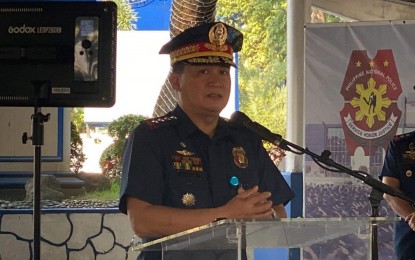
PNP chief, Gen. Dionardo Carlos (File photo)
MANILA – Philippine National Police (PNP) Chief, Gen. Dionardo Carlos, has denied claims made by some groups that he went to the exclusive island resort of Balesin to meet with the Ongpin family to discuss the case of a scion who has been linked to the death of contemporary artist Bree Jonson in September last year.
"There is no truth to the reported claim of the Jonson camp that I went to the island to meet the Ongpins to discuss the case of Julian Ongpin," Carlos said in a statement Wednesday night.
Former trade minister and businessman Roberto Ongpin, the owner of Alphaland Corp. that owns and operates the exclusive resort, is the father of 29-year-old Julian.
Julian was the boyfriend of the 30-year-old Jonson, who was found unconscious in their hostel room in San Juan town, La Union on Sept. 18, 2021 and was later declared dead in a hospital. The cause of death was asphyxia.
"The Julian Ongpin case was dismissed and is on appeal (motion for reconsideration). The DOJ (Department of Justice) and the NBI (National Bureau of Investigation) have been handling the parallel investigation, long before I was appointed as chief of the PNP. Any insinuation or attempt to link me to the Ongpin family is unfounded and baseless," Carlos said.
Carlos made headlines for his Balesin visit after the PNP Airbus H-125 helicopter deployed to fetch him crashed in Real, Quezon on Monday, injuring the two pilots and killing the enlisted crew member.
He said he was forced to request the PNP for transportation assistance as he would not make it in time for the flag-raising ceremony in Camp Crame, Quezon City if he took the chartered flight.
The La Union Regional Trial Court earlier dismissed the criminal case against Julian for lack of probable cause.
Julian yielded about 12 grams of cocaine at the hostel room.
According to the court, the policemen who arrested Ongpin failed to comply with the provisions of Section 21 of Republic Act 9165, or the Comprehensive Dangerous Drugs Act, which requires compliance with the chain of custody of seized illegal drugs.
Also lifted and set aside was the precautionary hold departure order against Ongpin.
Among the lapses noted was the absence of an indication that plastic sachets of suspected cocaine were individually marked and signed by the seizing officers; processing was done without Ongpin, who was already brought by police officers to the hospital for medical examination; and no witnesses, such as representatives of the media or Department of Justice and any elected public official, who are required by law to sign the copies of the inventory. (PNA)
